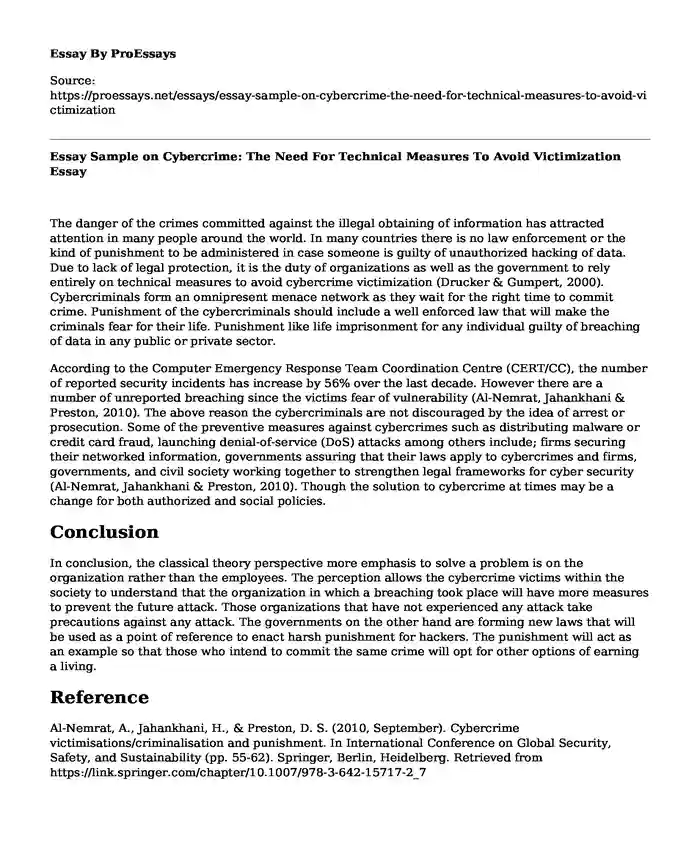The danger of the crimes committed against the illegal obtaining of information has attracted attention in many people around the world. In many countries there is no law enforcement or the kind of punishment to be administered in case someone is guilty of unauthorized hacking of data. Due to lack of legal protection, it is the duty of organizations as well as the government to rely entirely on technical measures to avoid cybercrime victimization (Drucker & Gumpert, 2000). Cybercriminals form an omnipresent menace network as they wait for the right time to commit crime. Punishment of the cybercriminals should include a well enforced law that will make the criminals fear for their life. Punishment like life imprisonment for any individual guilty of breaching of data in any public or private sector.
According to the Computer Emergency Response Team Coordination Centre (CERT/CC), the number of reported security incidents has increase by 56% over the last decade. However there are a number of unreported breaching since the victims fear of vulnerability (Al-Nemrat, Jahankhani & Preston, 2010). The above reason the cybercriminals are not discouraged by the idea of arrest or prosecution. Some of the preventive measures against cybercrimes such as distributing malware or credit card fraud, launching denial-of-service (DoS) attacks among others include; firms securing their networked information, governments assuring that their laws apply to cybercrimes and firms, governments, and civil society working together to strengthen legal frameworks for cyber security (Al-Nemrat, Jahankhani & Preston, 2010). Though the solution to cybercrime at times may be a change for both authorized and social policies.
Conclusion
In conclusion, the classical theory perspective more emphasis to solve a problem is on the organization rather than the employees. The perception allows the cybercrime victims within the society to understand that the organization in which a breaching took place will have more measures to prevent the future attack. Those organizations that have not experienced any attack take precautions against any attack. The governments on the other hand are forming new laws that will be used as a point of reference to enact harsh punishment for hackers. The punishment will act as an example so that those who intend to commit the same crime will opt for other options of earning a living.
Reference
Al-Nemrat, A., Jahankhani, H., & Preston, D. S. (2010, September). Cybercrime victimisations/criminalisation and punishment. In International Conference on Global Security, Safety, and Sustainability (pp. 55-62). Springer, Berlin, Heidelberg. Retrieved from https://link.springer.com/chapter/10.1007/978-3-642-15717-2_7
Drucker, S. J., & Gumpert, G. (2000). CyberCrime and punishment. Critical Studies in Media Communication, 17(2), 133-158. Retrieved from https://www.tandfonline.com/doi/abs/10.1080/15295030009388387
Cite this page
Essay Sample on Cybercrime: The Need For Technical Measures To Avoid Victimization. (2023, Sep 25). Retrieved from https://proessays.net/essays/essay-sample-on-cybercrime-the-need-for-technical-measures-to-avoid-victimization
If you are the original author of this essay and no longer wish to have it published on the ProEssays website, please click below to request its removal:
- Essay Example on Criminology Schools
- The Kirk Holdings v. Industrial Relations Commission Case Study
- Embezzlement Essay Example
- Coalition for Human Immigration Rights of Los Angeles Paper Example
- Improvements to the Correctional System Paper Example
- Gun Control Annotated Bibliography
- Essay Sample on Sneak and Peak Warrant: Combatting Terrorism & Crime







